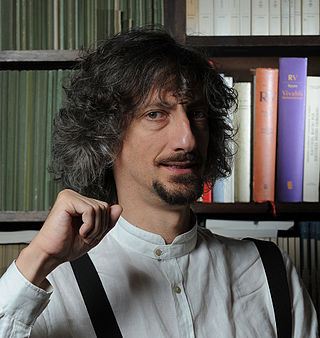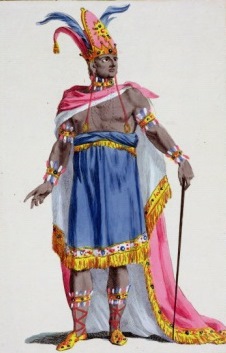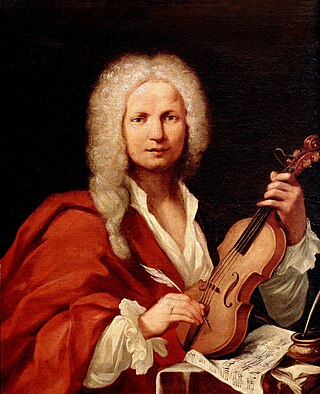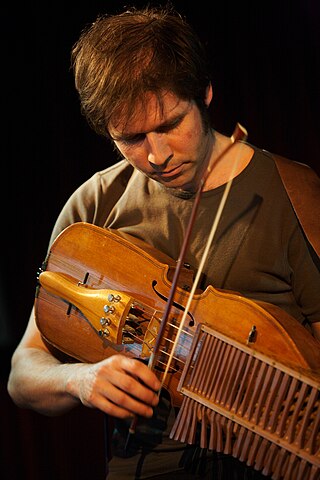
The viola da gamba, or informally gamba, is any one of a family of bowed, fretted, and stringed instruments with hollow wooden bodies and pegboxes where the tension on the strings can be increased or decreased to adjust the pitch of each of the strings. Although treble, tenor and bass were most commonly used, viols came in different sizes, including pardessus, treble, alto, small tenor, tenor, bass and contrabass. Separating these from other bowed string instruments such as the viola da braccio was the instruments' orientation; members of the older viol family were played with the neck oriented upwards, the rounded bottom downwards to settle on the lap or between the knees.

Federico Maria Sardelli is an Italian conductor, historicist-composer, musicologist, comic artist, and flautist, resident in Florence. He founded the medieval ensemble Modo Antiquo in 1984. In 1987, Modo Antiquo also became a baroque orchestra, debuting with the performance of Jean-Baptiste Lully's Ballet des Saisons in front of an audience of about five thousand.

Motezuma, RV 723, is an opera in three acts by Antonio Vivaldi with an Italian libretto by Alvise Giusti. The libretto is very loosely based on the life of the Aztec ruler Montezuma who died in 1520. The first performance was given in the Teatro Sant'Angelo in Venice on 14 November 1733. The music was thought to have been lost, but was discovered in 2002 in the archive of the music library of the Sing-Akademie zu Berlin. Its first fully staged performance in modern times took place in Düsseldorf, Germany, on 21 September 2005.

Hille Perl is a German virtuoso performer of the viola da gamba and lirone.
The Harp Consort is an international early music ensemble directed by Andrew Lawrence-King, specialising in Baroque opera, early dance-music, and historical World Music.

Vittorio Ghielmi is an Italian musician, conductor, composer. Compared by critics to Jasha Heifetz ("Diapason") for his virtuosity, and described as "An Alchemist of sound" for the intensity and versatility of his musical interpretations, Vittorio Ghielmi attracted notice while still very young for his new approach to the viola da gamba and to the sound of early music repertoire. His multifaceted training has made him an appreciated and creative musician as well as a sought-after conductor and coach for modern orchestras or orchestras with original instruments. He is Professor for viola da gamba and Head of the Department für Alte Musik at the Mozarteum Universität Salzburg and visiting professor at the Royal College of London. He is graduate at the Università Cattolica di Milano. He was born in Milan, Italy, where as a child he began his study of music with the violin, the double bass and later the viola da gamba and composition. In 1995 he was the winner of the "Concorso Internazionale Romano Romanini per strumenti ad arco" (Brescia). His fieldwork within old musical traditions surviving in forgotten parts of the world and bringing new perspectives to the interpretation of European "early music" led to him being presented the "Erwin Bodky Award" . He studied the viol with Roberto Gini, Wieland Kuijken and Christophe Coin (Paris). Associations with instrument maker, engineer and humanist Luc Breton (CH) as well as with many musicians of non-European traditions have been fundamental to his musical career, creating a deeper reflexion on the nature of sound used in early and modern European tradition . As viola da gamba soloist or conductor, he has appeared with many of the world's most famous orchestras in the fields of both classical and ancient music. He performs since youth recitals in duos with his brother Lorenzo Ghielmi and with the lutenist Luca Pianca, in the most important halls. As soloist or chamber musician, he has shared the stage with artists such as Gustav Leonhardt (duo), Cecilia Bartoli, Andràs Schiff, Thomas Quasthoff, Mario Brunello, Viktoria Mullova, Giuliano Carmignola, Christophe Coin, Reinhard Goebel, Giovanni Antonini, Ottavio Dantone, Enrico Bronzi etc. He is one of the few viola da gamba players regularly invited to appear as a soloist-conductor with orchestra. He has been invited to play in the world première of many new compositions, many of which have been dedicated to him . From 2007 to 2011 he was assistant to Riccardo Muti at the Salzburg festival. In 2007 he conceived with the Argentinian singer Graciela Gibelli and conducted a show, based on Buxtehude's "Membra Jesu Nostri", with the American film maker Marc Reshovsky (Hollywood) and the Swedish choir "Rilke Ensemble" (G.Eriksson); the project was produced by the Semana de musica religiosa de Cuenca (Madrid) and brought later to the Musikfest Stuttgart in 2010. Over three nights in 2009, he gave a performance of Forqueray's complete works for viola da gamba at De Bijloke, Ghent (B). He has been artist in residence at Musikfest Stuttgart 2010, the Segovia festival 2011, and the Bozar Bruxelles 2011. In 2012 he conducted Handel's Water music at the Portogruaro Festival (Venice) with a spectacle on the river Lemene conceived by Monique Arnaud. In 2018 he conducted the Opera Pygmalion by Rameau at the Drottningholms Slottsteater (Stockholm), with the régie of Saburo Teshigawara.; the new conception of this spectacle was so described in the Financial Times : "In their new production for Drottningholm Slottsteater, the Japanese dancer and choreographer Saburo Teshigawaraand Italian conductor and viola da gamba player Vittorio Ghielmi create a genuine masterpiece which combines exquisite music-making with experimental dance and modern lighting effects with the theatre’s unique 18th-century stage technology. Indeed, it is some time since the theatre has been so marvellously and innovatively put to use.“
Oni Wytars is an early music ensemble that was founded in 1983 by Marco Ambrosini and Peter Rabanser.

Lucia Ronchetti is an Italian composer.

Arsilda, regina di Ponto is a dramma per musica by Antonio Vivaldi. The opera was first performed at the Teatro Sant'Angelo in Venice on 27 or 28 October 1716.

Tieteberga is a partially lost dramma per musica by Antonio Vivaldi. The Italian libretto was by Antonio Maria Lucchini.

Archiv Produktion is a classical music record label of German origin. It originated in 1948 as a classical label for the Deutsche Grammophon Gesellschaft (DGG), and in 1958 Archiv was established as a subsidiary of DGG, specialising in recordings of Early and Baroque music. It has since developed a particular focus on "historically informed performance" and the work of artists of the Early music revival movement of the 20th and 21st centuries.

Didier François is a Belgian musician specialized in nyckelharpa and a sculptor living in Mechelen in Belgium.
The MA Festival Brugge, short for the festival Musica Antiqua Bruges in Bruges, Belgium, is a festival of early music and historically informed performances, started in 1960. The program includes concerts, master classes, conferences, visits in the region, exhibitions, instrument market, and international competitions that concentrates in a three-year cycle on organ, harpsichord, pianoforte and other period instruments, vocals, and baroque ensembles. The specialised festival is part of the Festival of Flanders.

Modo Antiquo is an Italian instrumental ensemble dedicated to the performance of Baroque, Renaissance, and Medieval music. It was founded in 1984 by Federico Maria Sardelli. Twice nominated for a Grammy award, the ensemble has an extensive discography, primarily on the Naïve, Brilliant Classics, and Tactus labels and have given the first performances in modern times of several works by Vivaldi. Modo Antiquo's larger ensemble is its Baroque orchestra led by Sardelli. It also has a smaller ensemble devoted to Medieval and Renaissance music led by Bettina Hoffmann.
Romina Basso is an Italian mezzo-soprano with an extensive discography of baroque opera recordings. She is particularly noted for her performances of Vivaldi.

Martha Elizabeth Blackman was an American viola da gamba player and lutenist.

Myrna Herzog is a Brazilian-born Israeli musician, conductor, teacher and early music researcher. She is a player of the viol, viola da gamba and baroque cello.

Judith Davidoff was an American viol player, cellist, and performer on the medieval bowed instruments. She was considered the “Grande Dame of the viol”, "a master of the viola da gamba and other stringed instruments" and "a central part of the early-music scene." Her recorded performances reflect her wide range of repertoire and styles, including such works as Schoenberg's Verklaerte Nacht and 13th-century monody. She is responsible for the catalog of 20th- and 21st-century viol music.
Musica Fiorita was an ensemble for baroque music founded in 1990 and based in Basel, which was conducted by the harpsichordist Daniela Dolci. The ensemble concentrated in particular on rediscovering unknown works by composers of the 17th and 18th centuries and their historical performance practice. In March 2020, it ceased its concert activities.













